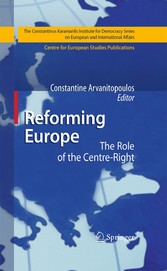Suchen und Finden
"The Centre-Right for a New Europe (p. 23-24)
Jean-Dominique Giuliani
The roots of political Europe lie in the history and specific commitment of a political family: the centre-right. Robert Schuman, Konrad Adenauer and Alcide De Gasperi shared the same political beliefs. They provided the impetus to make the unification of the European continent possible, believing that this was the only means of bringing back long-term peace.
This was therefore the foundation of European prosperity. Today the centre-right governs 14 Member States and is part of four major coalitions. During the seventh European elections by direct universal suffrage, which took place between 4 and 7 June 2009, the European Peoples Party (EPP) won 265 seats and remained the first political group in the European Parliament.
These European elections were the occasion for new debates, within which the political platforms put forward by the major transnational parties will have played a major role. Political debates were still extremely nationally oriented, of course, but a great number of international subjects were dominant in European politics, for which the centreright had prepared itself well. During the European elections in June 2009 the main transnational parties promised to lead a European campaign on European subjects. The EPP published its draft manifesto on 30 January 2009. Creating new jobs and making the economy greener were two of the key messages in the EPP’s platform in the elections last June (European People’s Party, 2009). Its platform was adopted on 29 April 2009 during the EPP Convention in Warsaw. The EPP comprises 47 political parties, 19 observer parties and six associates.
The desire for a common European foreign policy, the will to fight climate change and to develop renewable energy sources together with the need to face the economic and financial crisis with European policies – these are all EPP ideas that are now shared by all of the major European political movements. However, the Christian Democrats of the EPP do not hesitate to introduce the security dimension into their proposals as well as their desire for a family policy – a specific innovation – that can rise to the demographic challenge we face. Europeans must have greater awareness of the protective role played by the EU and its policies. They have the right to find at the European level the appropriate answers to fundamental questions regarding their future.
It is the leading European party. Of course the range of opinions among the member parties is wide, but they all share a common vision. They promote the idea of a free and open economy, strong social links and true solidarity within society; they reject the old ideologies which have often slipped into totalitarianism or which foster unrealistic dreams. In the EPP’s platform we find that the human being is the heart of political concern and that he or she has to be protected, promoted and respected as far as beliefs and freedom are concerned – all this being the final goal of any political organisation. Confessional or not, these beliefs undoubtedly are the core of the European project, and it is therefore true that the EPP has a role to play in continuing and enhancing European unification."
Alle Preise verstehen sich inklusive der gesetzlichen MwSt.









